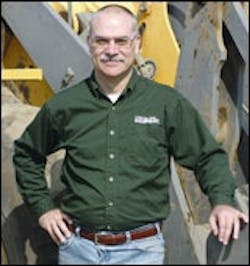Full and Maximum Attention Can Prevent Machine Accidents
Last month, as some of our co-workers were returning from lunch, traffic quickly halted for an accident that had closed the road. Lying on its side was a backhoe-loader, which had fallen off the flat-bed trailer hauling it.
As the truck and trailer were passing under a bridge, the machine hit the bridge and was knocked off the trailer. Tragically, the backhoe-loader fell sideways into oncoming traffic and landed on top of two cars. One woman was killed.
The woman in that car would not be coming home. She was not at fault, and there was absolutely nothing she could have done to avoid or protect herself from this accident. But she was dead.
Our thoughts also turned to the truck driver and how he must be suffering. We don't know the specifics of the incident, but no traffic tickets were issued at the scene. We can only presume that no grievous mistakes were made and that this was an accident, pure and simple.
Any manager of a fleet of construction equipment, however, surely considers this and every accident related to machinery not only a tragedy, but also a mystery. Were there any actions that could have prevented this?
"Safety is no accident" has become a cliche. Safety sessions, posters and benchmarks are becoming common. And they are all important. But like the sound of backup alarms on trucks, are we really paying attention?
It only takes a moment for a warning signal to be missed or for a situation to change dramatically. In many cases, no human being could react to what so rapidly unfolds in front of him or her.
But for every truly accidental tragedy, how many other tragedies are avoidable? How many times does our attention drift leading up to that critical moment, the last moment in which anything could be done to avoid disaster?
We're not calling for more and better safety programs, nor are we pointing unnecessary fingers. We are simply grieving a tragedy. It's local for us, but it happens all over the country more often than it should.


